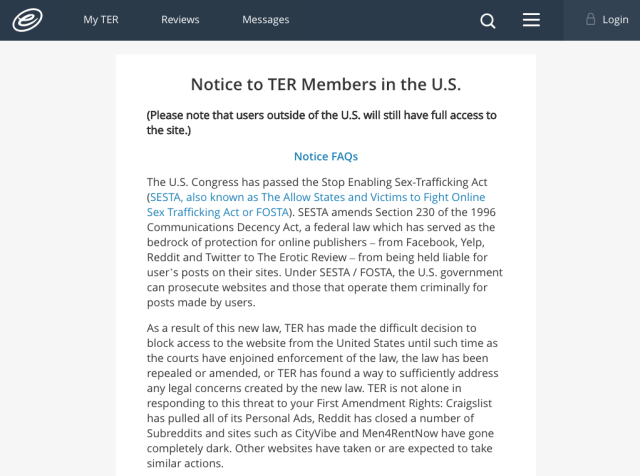A website that hosts customer reviews of sex workers has started blocking Internet users in the United States because of forthcoming changes in US law.
Congress recently passed the Stop Enabling Sex Traffickers Act bill (SESTA), and President Trump is expected to sign it into law. SESTA will make it easier to prosecute websites that host third-party content that promotes or facilitates prostitution, even in cases when the sex workers aren't victims of trafficking.
After Congress approved the bill, Craigslist removed its "Personals" section and Reddit removed some sex-related subreddits. The Erotic Review (TER) has followed suit by blocking any user who appears to be visiting the website from the United States.
"As a result of this new law, TER has made the difficult decision to block access to the website from the United States until such time as the courts have enjoined enforcement of the law, the law has been repealed or amended, or TER has found a way to sufficiently address any legal concerns created by the new law," the website's home page says in a notice to anyone who accesses the site from a US location.

The Erotic Review explained in an FAQ why it blocked US-based users even before SESTA takes effect. (The bill is also known as the Allow States and Victims to Fight Online Sex Trafficking Act, or FOSTA.)
"TER has always operated within the law, and it takes SESTA seriously," the FAQ says. "Because we do not know when SESTA will be signed into law, TER wants to be certain that it is in compliance with the statute the moment it becomes effective."
TER is still accessible outside the US, and US-based users can access the site with Virtual Private Network services that make users appear to be located in other countries. Non-US users are asked to agree to a disclaimer, which requires users to agree to "report suspected exploitation of minors and/or human trafficking" and that they "will not access TER from a Prohibited Country."
The Erotic Review was started in 1999 and is operated by Treehouse Park, which is based in the Netherlands. In 2009, the company cut ties with its founder David Elms after he was arrested. Elms was arrested in Arizona "for allegedly trying to hire someone to assault a business rival" and was sentenced to four and a half years in prison in 2010, the Associated Press reported at the time.
Backpage shut down—though SESTA isn't law yet
SESTA was inspired largely by the existence of Backpage. But federal law enforcement authorities were able to shut Backpage down last week, even though SESTA hasn't been signed into law yet. Trump may sign the bill this week.
TER said that it "intends to come back online in the US as soon as our attorneys tell us that we have sufficiently addressed any legal concerns created by the new law."
But the site's FAQ noted that "TER is not alone in responding to this threat to your First Amendment Rights: Craigslist has pulled all of its Personal Ads, Reddit has closed a number of Subreddits, and sites such as CityVibe and Men4RentNow have gone completely dark. Other websites have taken or are expected to take similar actions."
Sex workers oppose website shutdowns
Some sex workers have spoken out against SESTA, saying that websites can help sex workers screen clients and avoid dangerous situations. A group called Survivors Against SESTA says the new law "will cause harm to vulnerable populations engaging in the sex trade without helping trafficking victims."
"Shutting down websites that sex workers use to work indoors and screen clients more safely does not stop traffickers," the group also says. "To the contrary, this only drives sex workers, including those who are trafficked, to find clients on the street where they face higher rates of violence, HIV, Hepatitis C and sexually transmitted infections, and exploitation."
The Erotic Review has reportedly caused problems for some sex workers, though. The website says it helps clients avoid "wast[ing money] on someone who doesn't deliver as promised," and it has been criticized by sex workers who object to online reviews. A Vocativ article in March 2016 reported that sex workers say "the site harbors a culture of misogyny and objectification, and [it] exposes them to extortion, legal risks, and pressure to perform unwanted acts."
A San Francisco-based sex worker who decided to "delist" herself from The Erotic Review expanded on some of those complaints in an open letter last week. While she "undeniably benefited from TER… it came at the large cost of my privacy and autonomy," she wrote.
[contf] [contfnew] 
Ars Technica
[contfnewc] [contfnewc]






